第一讲:英汉词类对比
【理论翻译与实践】PPTPPT第二单元+第一讲+英汉翻译讲座--英汉语言对比

课内练习
现在请大家练习翻译以下两个句子,特别注意句子的主干和连
接部分的翻译
1. The moon is so far from the earth that even if huge trees were growing on the mountains and elephants were walking about, we could not see them through the most powerful telescopes which have been invented.
▪ 在不同的语言中,句子内部连接或外部连接 几乎都是用三种手段:句法手段(Syntactic devices)、词汇手段(Lexical equivalence) 和语义手段(Semantic connection)。用前 两种手段连接成为形合(hypotaxis),用后 一种手段连接成为意合(parataxis)。
was very hungray because he had had no food
for two days.
[参考译文] 男孩哭得心都快碎了,当我问及他时, 他说饿极了,有两天没吃了。
从上例可看出,英语十分注重句子的形式和 结构的完整,上面英语句子主干为The boy said, 但节外生枝,叠床架屋,竟有5个从句,用了who, as if, when, that, because等多个连接成分,形成 一个空间构架,犹如“枝叶繁茂的参天大树”, 呈树状。而相应的汉语节节展开,言简意赅,语意 连贯,结构紧凑,呈竹状。
▪ 英语重形合汉语重意合。语言学家王力曾形 象地指出:西洋语的结构好像连环,虽则环 与环都联络起来,毕竟有联络的痕迹;中国 语结构好像无缝天衣,只是一块一块的拼凑, 凑起来还不让它有痕迹......西洋语 法有很多呆板的要求,如每一个clause里必 须有一个主语......中国语法只以达 意为主,如初系的目的语可兼次席的主语, 又如相关的两件事可以硬凑在一起,不用任 何的connective word。(转引自《英汉互译 实践与技巧》,176页)
汉英语法对比第一讲综合语和分析语ppt课件
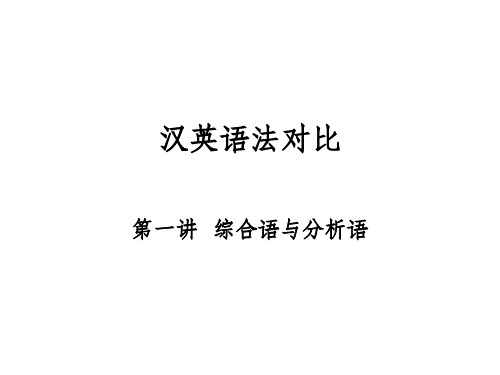
汉语: 怎么了,你? 她文章写得很好。 酒他喝得太多。
汉语语序改变大多把宾语提到动词或主语之前,从 而引起宾语的句法功能的改变。
2. 定语位置灵活 比较: 英汉定语与中心词的顺序: A very important question A question of great importance 一个很重要的问题 A debatable subject A subject which can be debated 一个可以辩论的题目
汉语词头词尾大概有两类: 一是传统的:
老-,阿-,初,-子,-儿,-头 一是新兴的:
-度,-性,家,超-,非-,准汉语词缀去掉后,不影响意义与功能、用法。
桌子——方桌 旗子——红旗 粘附性不强。不会出现英语去掉词缀不成词的情 况。
汉语: 定语标志“的” 状语标志“地” 补语标志“得”
其区别是人为的,并无强制性。 表复数“们”——“我们” 动态助词“着”“了”“过”
3.英语常用介词,汉语则少用介词。 英语介词不仅数量大,而且使用频繁 汉语介词,大多从动词“借”来。王力认为,“现代中国语 根本就没有真正的介词。”
英译汉时,英语的介词常被译成汉语的动词: What is he at? 他正在干什么?
He is a man above vulgar interests. 他是一个脱离了低级趣味的人。
可用动词后,但不用的情况也有很多。
He is dying.
英语
汉语
构词词尾(已讲)
表人名词、代词复数标
构形词尾
志“们”
-s表复数, -’s表领 各词有表领属的“的”
格
定语标志“的”
代词有性、数、格、 状语标志“地”
人称变化
《英汉语言对比》课件

汉语是一种意合语言,主要依靠语境和语序来表达意义。
汉语句子结构以主题+谓语为核心,强调主题的突出和语序的自然。
汉语中常用主动语态来强调动作的执行者,使句子更加生动、形象。
汉语中常用动词来表达具体动作,使语言更加生动、具体。
01
02
03
04
英语重形合,汉语重意合;
英语多用被动语态,汉语多用主动语态;
例如,“一”在英语中是“one”,在汉语中是“一”;“二”在英语中是“two”,在汉语中是“二”。
数字词汇对比
例如,“东”在英语中是“east”,在汉语中是“东”;“西”在英语中是“west”,在汉语中是“西”。
方位词汇对比
CHAPTER
04
语法对比
英语具有丰富的形态变化,包括名词的数、格,动词的时态、语态、语气等。
01
02
04
03
CHAPTER
02
英汉语言概述
英语是一种形合语言,主要依靠显性的形态变化来表达语法关系和意义。
英语中常用被动语态来强调动作的承受者,使句子结构更加紧凑。
英语句子结构以主语+谓语为核心,通过丰富的时态、语态和词形变化来表达动作的时间、方式和状态。
英语中常用名词化手段来表达抽象概念,使语言更加客观、正式。
CHAPTER
06
文化背景与语言对比
英语文化背景概述
01
英语是世界上最广泛使用的语言之一,起源于欧洲,后传播至全球。英语文化背景涵盖了英国、美国、加拿大等国家的文化传统、价值观、历史、社会制度等。
英语文化特点
02
英语文化强调个人主义、竞争和自我实现,鼓励创新、冒险和自我表达。在英语文化中,礼貌和得体非常重要,人们注重建立和维护良好的人际关系。
英汉名词动词对比对比课件
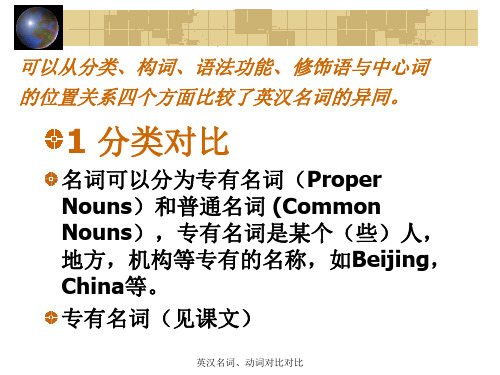
英汉名词、动词对比对比
2)英语名词和汉语名词有时都可以做状语 ,但汉语可
单独作状语,英语名词常常是和其他的修饰语一起构成 名词词组作句子的状语
例如:“集体购票、电话购票、笑脸迎人、公 费出国留学、现金支付、现场直播、批判继承” 等。
• 一个单词充当定语时, 前置。She is a beautiful girl!
• 而一个词组或一个句子充当定语时则要后置,
• 电影《黑巷少女》” The Little Girl Who Lives Down the Lane “ • A lone girl who lives with her father whom hasn't been seen for quite
[The moment]he saw me, he nodded me
[The moment]是名词做状语
单词作状语(不是词组)的例外。
英汉名词、动词对比对比
单词作状语的例外,what did you do yesterday?(“They waited hours.
next/last/this/one/every/each/some/any/all+
今天星期六(名词作谓语表时间), 昨天国庆节(名词作谓语表节日), 昨天晴天(名词作谓语表天气), 王小华,绍兴人(名词作谓语表籍贯 )。 潘老太太五十七岁了(名词作谓语表年 龄), 她大眼睛,红脸蛋(名词作谓语表容 貌)。
英汉名词、动词对比对比
汉语的名词谓语句一般都可以加 “是”,很像英语中的系表结构。
a long time
第一节 英汉词类比较

第一节英汉词类系统比较1.冠词比较。
英语中有冠词,汉语中没有。
例如:A pair of pantsA full glass of orange juice在许多情况下,定冠词省略不翻译:有时,需要用这或那将其翻译出。
例如:The Blacks live downstairs.2.英语连词使用率比汉语低。
英语重形态结构,而汉语重内在联系。
翻译时省略不翻译。
例如:Write to me when you have time.They were moved that tears came to their eyes.3.英语感叹词表示的感情细致,不易翻译出,需要上下文仔细琢磨。
例如:Ah! You are back in time.Ah! Never have I heard such a Mr. Smith.4. 英语介词数量多,使用广泛,意义变化大,而汉语介词则比较少,使用面窄,意义比较稳定。
有些表示时间、地点的介词可以省略不翻译。
有些含有动作意味的介词,如to, towards, across, past等,可以转译成动词。
In 2000, he left his old mother alone for New York.Across the street, he went into the post and telecommunications office.5.英语代词的使用率远远高于汉语,常常省略不翻译。
例如:One should help those who are in difficulty.He covered his eyes with his hands.One should never pretend to know what one does not.6. 数字翻译要核实无误。
例如;1.5 billion 15 亿有些情况要考虑汉语的翻译习惯:如:to be of two minds / either one or the otherThey stepped into the banquet hall in two or threes.7. 名词单、复数形式意义上的不同、所有格的翻译、抽象名词具体化翻译等。
英汉比较英汉十大结构性差异课件

目录
• 英汉词序差异 • 英汉句式差异 • 英汉表达方式差异 • 英汉文化背景差异 • 英汉语言发冠词位置差异
01
英语中冠词的位置通常在名词之 前,如“the car is red”。
02
而在汉语中,冠词通常放在名词 之后,如“这辆车是红色的”。
宗教信仰差异对英汉语言的影响
英汉两种语言的很多表达方式都反映了各自的宗教信仰。例如,英语中常用“God”来表 示惊讶或惊讶的程度,而汉语则常用与佛教相关的表达方式,如“天哪”、“我的天”等 。
社会习俗影响
01
社交习惯的差异
在英语文化中,人们通常更注重个人隐私和独立性,而在 汉语文化中,人们更注重集体主义和相互依赖。这种文化 差异在英汉语言表达方式上也有所体现。
02 03
礼貌用语的差异
在英语文化中,人们通常使用更为直截了当的礼貌用语, 而在汉语文化中,人们更倾向于使用含蓄和委婉的表达方 式。例如,英语中常用“Thank you”来表达感谢,而在 汉语中则常用“麻烦你了”、“有劳你了”等更为复杂的 表达方式。
社会习俗差异对英汉语言的影响
社会习俗的差异也对英汉语言的发展产生了影响。例如, 英语中常用“Mr.”、“Mrs.”等称呼来表示对男性和女性 的尊重,而在汉语中则常用“同志”、“师傅”等称呼来 表示彼此之间的亲近和信任。
04
英汉文化背景差异
宗教信仰影响
基督教在英语文化中的影响
基督教在英语文化中有着深远的影响,体现在语言、文学、艺术和价值观等多个方面。例 如,英语中有很多表达方式都源自基督教,如“God help me”、“forgive me my sins”等。
佛教在汉语文化中的影响
Lecture 1-2 词汇对比

do large harm to do great harm to
great population
a large population crowded traffic heavy traffic
keep one’s face save one’s face
留面子
三、 情感意义对比
教师休息室 teachers’ restroom
sea cucumber 海黄瓜
海参
不能望文生义,要勤查 字典,避免貌合神离
4. Mr. Smith is one of the most durable teachers at this university. 持久的 史密斯先生是该大学任教时间最长的教师之一. 5. He used to be very shy; but after entering college he’s started to blossom. 开花、绽放 他过去一直非常害羞,但是现在他开始活泼/开朗起来。
译文一:…… made our blood boil. 愤怒 译文二:Beijing's winning the bid for the 2008 Olympics ek 凉茶 红茶 cold tea red tea
yoghurt herbal tea black tea teachers’ lounge
3. 意见 (1) 我们应该认真倾听群众的意见。
看法
We should listen carefully to people’s opinions. (2) 两位领导人就双边关系及共同关心的问题交换了意见。 见解 (fml) The two leaders exchanged views on bilateral relations and issues of common concern.
英汉词汇对比 ppt课件

2021/3/30
13
缩略构词法对比 缩略构词符合语言经济原则。 汉语缩略词分双音节和三音节: 高校、 地铁、科研、
彩电、纪检、家电、奥运会、海内外、师兄弟、离 退休、企事业、高富帅 英语首字母缩略:
词的文字理据表现为词的文字书写形式与词义 之间的联系。可以从一个词的文字书写形式上 推断出该词的词义。
一般而言,表意文字有文字理据,表音文字没 有。
语音理据(基本拟声词)和语义理据(具有文 化背景知识的词语)是英汉词汇语义学对比的 重点。
汉语的形态理据较缺乏,而英语的文字理据几 乎没有。
2021/3/30
整体上,英语形态理据性比汉语强:可以 从词根和词缀中推知派生词词义;复合词 词义大多数是透明的。
按词与词之间的关系,可分:
偏正(英汉):daydream, homework, grass-green, 小说,火红,雪白,辈出,冰箱 动宾/宾动(英汉):push-button, English-speaking, brainwash, 结果,用功,拼命,
泄气
主谓(英汉):sunrise,earthquake, 地震,面对,文明 联合(英汉):wait-and-see, 途径,语言,美丽,忘记,是非,尺寸 补充(汉)/补动(英) :加强,破坏,提高,车辆, home-made, whitewash,
2021/3/30
14
词汇语义学对比
词汇的理据性对比 词化程度对比 词的搭配对比
2021/3/30
15
词汇的理据性对比
词的表达形式与词义之间有时具有某种内在联系,从 这些表达形式中可推断出词的意义,这就是词的理据 性。
《汉英词汇对比》PPT课件

h
24
句法现象的对比
时态对比:
英语的时态有十六种,与汉语的时态相比要复 杂得多,汉语一般没有时态的变化。
如:I will go to Beijing tomorrow afternoon. 我明天下午去北京。
h
7
• 英汉词语不对应 (words without correspondence ):
• Teenager: 13至19岁的青少年 • Clock-watcher: 老是看钟等下班的人 • Prey: 被捕食的动物 • Dink=double income no kids 丁克家族
h
8
英汉词汇现象的对比---词序
• Such was the force of explosion that all the windows were broken. 爆炸的威力如此之大, 所有的窗户都震破了。
• Young as she is, she has seen much of the world. 她年纪轻轻,可见过不少世面。
• 英语先概括,语义重心在前面 • 然后分解开来
h
4
• I strongly believe that it’s in the interests Of my countrymen that China should remain an active and energetic power in global economic matters.
• He was born in Shandong on May 1, 1990.
h
22
• (1) .The cruel murder of the patriot has
understandably aroused worldwide indignation.
英汉对比(词)知识讲稿

词汇教学重点
在英语教学中,词汇教学重点是 扩大学生的词汇量,帮助学生理 解词汇的语义和用法;在汉语教 学中,除了词汇本身,还需要注
重词汇的文化内涵。
词汇教学方法
英语和汉语的词汇教学方法存在 差异,如英语教学中常使用词根、 词缀等方法帮助学生记忆和理解 词汇,而汉语教学则更注重词汇
的实际运用。
词汇评估标准
文化负载词
英语和汉语中存在许多具 有文化特色的词汇,这些 词汇在跨文化交际中需要 特别注意。
语境依赖
英语和汉语中的词汇往往 需要在特定的语境中理解 其含义,否则容易引起误 解。
语言习惯差异
英语和汉语的语言习惯存 在差异,如英语强调客观, 汉语强调主观感受,这反 映在词汇的使用上。
英汉词汇在语言教学中的作用对比
英汉词汇的语义场对比
总结词
英汉词汇语义场存在交叉和重叠
详细描述
尽管英汉词汇在构词法和词源上存在差异,但它们的语义场仍存在交叉和重叠。例如,“狗”在英语和汉语中都 表示家养动物,但在某些语境中,它们的含义并不完全相同。因此,在翻译和跨文化交流中,需要特别注意词汇 的准确含义和用法。
03 英汉词汇语义对比
文化意义不同
英汉词汇的文化意义也可能存在差异,如英语中的“lucky dog”表示“幸运儿”,而在汉 语中则没有这个意思。
情感色彩不同
英汉词汇在情感色彩上也可能存在差异,如英语中的“gay”可以表示“快乐的”,也可以 表示“同性恋的”,而汉语中的“基”则没有这个意思。
英汉词汇的语义空缺
文化特有词
英汉词汇中存在一些文化特有词,即 只在某一文化中存在的词汇,如汉语 中的“功夫”、“太极”等,在英语 中没有对应的词汇。
新兴词汇
英汉比较(词)PPT课件

The record has been considered soft ever since it was set last May.
自从五月份创造了这个纪录以来,人们一 直认为它是很容易被打破的。
The landing must be super-soft, made at a velocity of 18 miles or so an hour.
姐,妹
morning
早晨,上午
-
4
(三)英语中有些词所表示的意义,目前在 汉语里还找不到最后确定的对应词来表达。 这主要是英语中一些新词,包括专用名词、 术语以及一些反映英美社会特殊风气及事 物的词。
Mascon (mass concentration)
(表示月球表层下高密度的)物质聚积
-
5
Beddo
计算语言学
-
2
The Pacific Ocean tuberculosis (TB) helicopter minibus
太平洋 结核病 直升飞机 面包车
-
3
(二)英语中有些词与汉语中有些词在词义 上只有部分对应。它们在意义上概括的范 围有广狭之分。
marriage
娶,嫁
gun
枪,炮
sister
目前,关于敌人的意图还只有不太充分的 情报,我们不能鲁莽行事。
-
9
total
To wreck beyond repair彻底撞毁
An earlier POW returnee was given a new Convette by a Denver dealer and totaled it the next month.
Particles moving round their atomic uncleus (post)
英汉词类对比
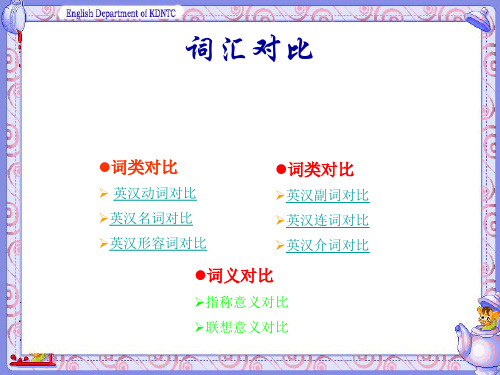
汉语词汇的褒、贬意义没有明确标示出来,需根据语言使用的社会 背景与习惯来确定其褒、贬之义。
根据刘毖庆的研究,“中国传统思维也非常重视悟性.汉语常常不 是凭借严谨的形式分析,而是靠‘悟’出个关系来。我们也常常将 这种思维方式称为‘直觉思维’-一悟性往往导致语言中过度的模 糊化”〔比如‘中央和地方’中的‘地方’究竟指哪一级?是省? 是区?是县?还是一种统称?” 又如,当我们说某人文章写得“行 云流水”,有些人认为是写得很流畅(fluently and smoothly ) , 有些人认为是写得很自然(naturally and spontaneously)
record v. 记录, n. 唱片 兼三类的词:level adj. 平的, n. 平面, v. 平整 兼四类的词:full adj. 满的,adv. 十分, n. 全部, v. 变圆;
兼类词举例:
He is not down yet. 他还没下来呢。(形作表)
She’ll come down and see you. 她就会下来见你了。 (副作状)
雨后春笋 be like bamboo shoots after a spring rain
F.词语的排列顺序不同
前后back and forth 新旧old and new
冷热hot and cold
血肉flesh and blood 悲欢joy and sorrow 水火fire and water 水陆land and water 贫富rich and poor 迟早sooner or later
G.习语中的数词使用可能不同
三思而行 think twice 三心二意 in two minds 乱七八糟 at sixes and sevens 三言两语 in one or two words 百里挑一 on in a thousand 一窍不通 not to know the ABC
英语词类与汉语词类的比较
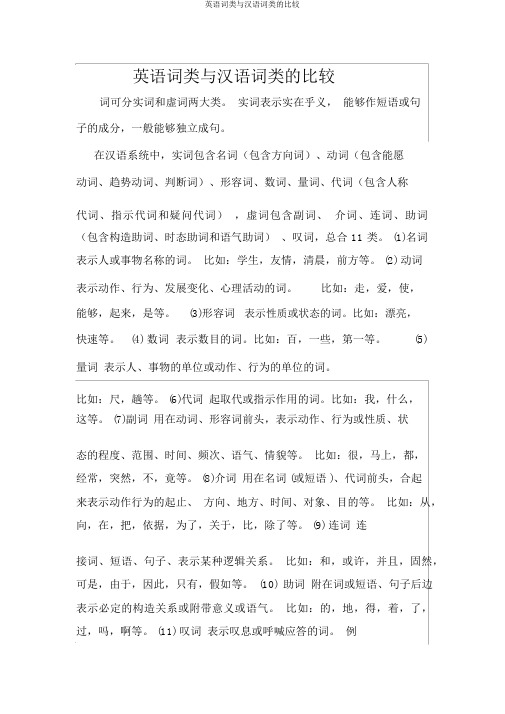
英语词类与汉语词类的比较词可分实词和虚词两大类。
实词表示实在乎义,能够作短语或句子的成分,一般能够独立成句。
在汉语系统中,实词包含名词(包含方向词)、动词(包含能愿动词、趋势动词、判断词)、形容词、数词、量词、代词(包含人称代词、指示代词和疑问代词),虚词包含副词、介词、连词、助词(包含构造助词、时态助词和语气助词)、叹词,总合 11 类。
(1)名词表示人或事物名称的词。
比如:学生,友情,清晨,前方等。
(2) 动词表示动作、行为、发展变化、心理活动的词。
比如:走,爱,使,能够,起来,是等。
(3)形容词表示性质或状态的词。
比如:漂亮,快速等。
(4) 数词表示数目的词。
比如:百,一些,第一等。
(5)量词表示人、事物的单位或动作、行为的单位的词。
比如:尺,趟等。
(6)代词起取代或指示作用的词。
比如:我,什么,这等。
(7)副词用在动词、形容词前头,表示动作、行为或性质、状态的程度、范围、时间、频次、语气、情貌等。
比如:很,马上,都,经常,突然,不,竟等。
(8)介词用在名词 (或短语 )、代词前头,合起来表示动作行为的起止、方向、地方、时间、对象、目的等。
比如:从,向,在,把,依据,为了,关于,比,除了等。
(9) 连词连接词、短语、句子、表示某种逻辑关系。
比如:和,或许,并且,固然,可是,由于,因此,只有,假如等。
(10) 助词附在词或短语、句子后边表示必定的构造关系或附带意义或语气。
比如:的,地,得,着,了,过,吗,啊等。
(11) 叹词表示叹息或呼喊应答的词。
例如:喂,哎呀,嗯等。
(12) 拟声词模拟声物声音的词。
比如:砰,轰隆,哗啦啦等。
构造助词“地”“的”能够合用为“的”,即定语、状语都用“的”:(伟大 )的人民: (英勇 )的行进。
但不作硬性规定,如分开用,要用得正确,定语用“的”,状语用“地”。
传统的英语语法把词分为十类,名词、动词、形容词、副词、代词、冠词、介词、连词、数目词和叹息词。
《英汉词汇对比》课件

英语和汉语中的主动语态表达方式也有所不同,例如英语中 的主动语态通过动词原形表示,而汉语中的主动语态则通过 添加“把”等词语来表示。
04
英汉词汇的习语对比
动物习语对比
动物习语对比
在英语和汉语中,有些动物词汇具有特定的文化含义和象征意义。例如,“龙” 在汉语中是吉祥、权力和成功的象征,而在英语中则没有类似的象征意义。
英汉词汇的创新发展
新词的创造
随着社会的发展和科技的进步,新的概念和事物不断涌现,英汉词汇也在不断创新。例 如,“selfie”(自拍)就是一个近年来新出现的英语词汇,而汉语中也有类似的新词
,如“网红”、“拼车”等。
网络语言的流行
网络语言是近年来英汉词汇创新发展的一个重要方面。网络语言的特点是简洁、生动、 幽默,如英语中的“LOL”(Laugh Out Loud)和汉语中的“给力”等。
音译与形译
音译
根据外语词汇的发音,寻找发音相近 的汉语词汇。适用于人名、地名和技 术术语等。
形译
根据外语词汇的拼写形式,寻找拼写 相似的汉语词汇。适用于形象特征明 显的词汇。
加注与解释
加注
在译文中添加注释,解释外语词汇的文 化背景、用法和含义等。适用于文化差 异较大的词汇。
VS
解释
在译文中对词汇进行解释,说明其含义和 用法。适用于含义较为抽象或复杂的词汇 。
等构词元素来创造新词。
汉语词汇的特点
汉语词汇比较注重意义和内涵,表 达方式相对固定,新词的创造通常 是通过语义引申或借词来实现的。
英汉词汇的分类
英语词汇可以分为名词、动词、形 容词、副词等类,而汉语词汇也可 以根据语义和语法进行分类。
英汉词汇的文化内涵
英语词汇的文化内涵
英汉语言对比第一课
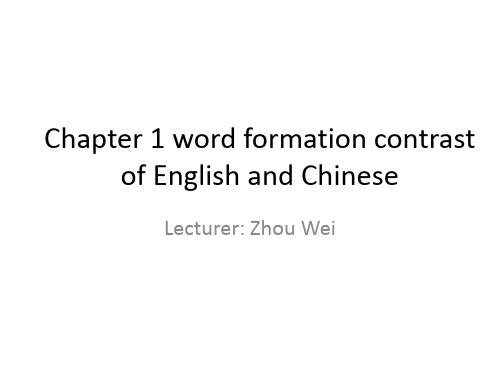
Lecturer: Zhou Wei
Do you know?
• • • • • 1. What is a word? 2. What is vocabulary? 3. What is affixation? 4. What is compounding? 5. What is abbreviation?
Affixation
• 根据我们对Zeiger所编的《英语百科》一书 中列举的词根、词缀进行的统计,共计647 个,其中词根359个,词缀288个,前缀107 个,后缀181个。而汉语的词缀比较少,根 据《现代汉语词典》(2002年增补本)的观点, 词典中明确标注为词缀的,前缀才2个“老、 阿”,后缀6个“子、儿、头、家、生、化、 然”,有很多词缀的身份有待与进一步证 明。
• • • •
Suffixation: adding an affix to the end eg. friend→friendly eg. time→timely eg. move→movement
• 在英语中,一些后缀是功能词缀,帮助改 变词性。在动词和形容词后加“-ion",“ness",“-cy"等后缀,能使其变成名词,例 如 • Celebrate + ion = celebration • Act + ion = action Kind + ness = kindness • Good + ness = goodness Excellent + cy = excellency Bankrupt + cy = bankruptcy
第一讲:英汉词类对比
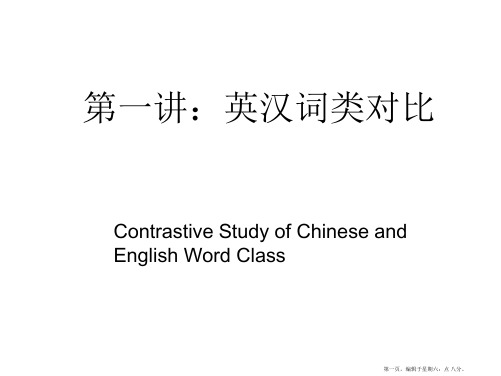
第二页,编辑于星期六:点 八分。
• 英语词类:
– noun, verb, adjective, numeral, pronoun, adverb, preposition, conjunction, interjection, article.
• 汉语词类:
– 名词、动词、形容词、数词、量词、代词、副 词、介词、连词、助词、感叹词、象声词
第十六页,编辑于星期六:点 八分。
• 名词还可以承担形容词的作用,如: • Moonlight stroll/ Love match/ College bills
• Generation gap/ All-night discussion/Service life
• Service manual/ War horse/ Wheel horse • Goose step!
• 医生的迅速到达和对病 人非常仔细的检查带来 了他的迅速康复。
• 医生迅速到达,并非常 仔细的检查了病人,因 此病人很快就康复了。
第十二页,编辑于星期六:点 八分。
• 宏观上来说:
• 英语
• 名词 优势
汉语
动词优势
• 介词优势 ( of, to and in )
• 就词汇系统而言,或词的总量而言,英语中名词占优势
第八页,编辑于星期六:点 八分。
• 不同点: • B:英语没有汉语那样发达的量词系统,如:
头、只、条、张、斤、根、个、棒等 • C: 英语有关系代词和关系副词(relative
pronoun and adverb),如who,which, whom,whose, which, where, when, why, what等,汉语则无。 • D:英语有冠词,汉语则无。To be, or not to be, that is the question
- 1、下载文档前请自行甄别文档内容的完整性,平台不提供额外的编辑、内容补充、找答案等附加服务。
- 2、"仅部分预览"的文档,不可在线预览部分如存在完整性等问题,可反馈申请退款(可完整预览的文档不适用该条件!)。
- 3、如文档侵犯您的权益,请联系客服反馈,我们会尽快为您处理(人工客服工作时间:9:00-18:30)。
• • • •
英汉名词的不同主要体现在以下方 面 1. 名词分类
英语名词分类较为复杂,分Proper noun和 Common noun。普通名词又分为 1)个体名词(Individual Nouns):表示某类人 或东西中的个体,如:gun。 2)集体名词(Collective Nouns):表示若干个 个体组成的集合体,如:family。
Homework
• He is a good eater and a good sleeper. • He was a clever man; a pleasant companion; a careless student; with a great propensity for running into debt, and a partiality for the tavern. (“Vanity Fair”).
• 宏观上来说: • 英语 • 名词 优势
汉语 动词优势
• 介词优势 ( of, to and in )
• 就词汇系统而言,或词的总量而言,英语中名词 占优势(静态的语言),汉语中动词占优势(动 态的语言)。 • 就词的动态观而言,即词的使用而言,汉语用动 词的地方英语里多用名词或介词。 • 系统观和动态观都是非常重要的世界观和方法论, 在语言研究中也是非常重要的
• 汉英虽然有差异,但是从功能总量上来说是相等的, 都能描述整个世界。
词类对比――名词
• 词类对比中我们将集中对比名词、动词、 形容词、副词、代词、介词、连词。
英汉语名词的异同
• 相同之处: 主要是作为同一种范畴的性质 所决定的,即都是用来表示人、地和事物 的名称的词。 • 不同之处:因为所属语言不同,所以在各 自所在的语言中分布或承担的功能(确切 地讲应当使出现的频率)不同。 • 练习
语法范畴( grammatical category)
• 定义: 对同类语法现象所作的抽象的概括和归类为语法 范畴。 • 狭义语法范畴指各词类内部各类语法现象所包含的共同 语法意义的概括和归类 (如印欧语Indo-European language名词的性、数、格,动词的时、体、态等)。 • 广义的语法范畴把词类也算作不同的语法范畴。更广义 的解释则将各种句法关系也包括在内(如并列、从属)。
•
英语名词性的标记: 1. 阴性词缀
• 英语中表示阴性常用特定的后缀加在阳性 名词或相应的动词后面,典型的阴性后缀 有:-ness, -ine, -tress, -trix, 但这些后缀一 般已不用于新词的创造。 • 示例 • 有时用前缀表示性别,如: • A he-ape a she-ape • A he-goat a she-goat
英语名词性、数、格 一. 性的标记
• 有些英语名词有性(gender)的形态标记 (morphological marker),在汉语中, 名词都不会因为性的原因而有特殊的词形 变化(morphological change)。 *Chinese is poor in morphological devices. (词缀)科学性 现代化 读者 饲 养员
英汉语词类系统的异同:
• A: 相同点: • 英汉语的词类基本相同。这反映语言的本 质。 • 相同名称的词类用法不同: 名词的数
• 不同点: • B:英语没有汉语那样发达的量词系统,如: 头、只、条、张、斤、根、个、棒等 • C: 英语有关系代词和关系副词(relative pronoun and adverb),如who,which, whom,whose, which, where, when, why, what等,汉语则无。 • D:英语有冠词,汉语则无。To be, or not to be, that is the question
第一讲:英汉词类对比
Contrastive Study of Chinese and English Word Class
术语的界定
• 词类: (word class) • 词的语法分类,语言中的词都有不同的语 法功能,依此而划分为不同的类,称为词 类。 • 区分词类的目的在于说明语言的结构,也 便于指明词的用法。
示例分析
• The doctor’s extremely quick arrival and uncommonly careful examination of the patient brought about his very speedy recovery. • 医生的迅速到达和对 病人非常仔细的检查 带来了他的迅速康复。 • 医生迅速到达,并非 常仔细的检查了病人, 因此病人很快就康复 了。
汉英词类对比:词类划分的依据
• 词在句中的功能在汉英词类划分中都有决 定性的作用, 但是,从总体上来看,汉语词类 划分在注重词的功能的同时,也注重词的意 义(很大程度上取决于语境)。 • 汉语中有量词,而英语中将量词归于名词,因 为在英语中名词和量词在句中发挥同样的 功能; • 汉语词本身不能体现其词性,而在很大程 度上取决于实际使用的语境,同一词在不 同的语境中可能有不同的词性。
•
•
3)物质名词(Material Nouns):表示无法分 为个体的实物,如:air。
4)抽象名词(Abstract Nouns):表示动作、 状态、品质、感情等抽象概念,如:happiness, love.
专有名词 个体名词
可数名
词
集合名词
名词 普通名词 名词 物质名词 不可数
抽象名词
• 但有些词既可以是可数意义,也可是抽象 名词,因而可用作不可数意义。 • 如: • There is no school tomorrow.(抽象、不可 数) • A glass is made of glass.(可数、不可数)
• 她能吃能睡。 • 她是个聪明人,很好相处,可是学习 不肯 用功,老是东挪西借,又喜欢上酒店喝酒。
Overuse of nouns in English
The effect of the overuse of nouns in writing is the placing of too much strain upon the verbs and the resultant prevention of movement of the thought. 写作时过分使用名词,势必给动词增加太多 的负担,因而阻碍思路畅通。 One who overuses nouns in writing places too much strain upon the verbs and as a result prevents the thought from moving along.
性的标记: 2. 加词法
• 在名词前面加上表示性别的词,颇似汉语表示性 别的方法,如: • A boy student /a girl student • A man/maid servant • A male/female nurse • A male/female frog(sparrow) • 有时在名词后面加上表示性别的词,如: • Englishman Englishwoman • Salesman saleswoman • Landlord landlady • Stepfather stepmother
相关概念
• 语法范畴( grammatical category) • 对同类语法现象所作的抽象的概括和归类 为语法范畴。
语法范畴( grammatical category)
• 定义: 对同类语法现象所作的抽象的概括和归类为语法 范畴。 • 狭义语法范畴指各词类内部各类语法现象所包含的共同 语法意义的概括和归类 (如印欧语Indo-European language名词的性、数、格,动词的时、体、态等)。 • 广义的语法范畴把词类也算作不同的语法范畴。更广义 的解释则将各种句法关系也包括在内(如并列、从属)。 Hierarchy system
常见的日常用语: Congratulations! Good morning! Happy birthday! Cheers! For your health! To horse! 【军】上马! (口令) Attention! Hands up!
英语中的名词优势
• 有时即时用了动词的形式,也把它们用作名词, 如: • I give the situation a big think for an about two seconds. • The film is an absolute must-see. • What’s the need, man? • If you step over to window 4, you’d have a shorter wait. • We stopped at pavilion for a short rest. • The appearance of the book on the market caused a sensation.
• 英语词类:
– noun, verb, adjective, numeral, pronoun, adverb, preposition, conjunction, interjection, article.
• 汉语词类:
– 名词、动词、形容词、数词、量词、代词、副 词、介词、连词、助词、感叹词、象声词
• 名词还可以承担形容词的作用,如: • Moonlight stroll/ Love match/ College bills • Generation gap/ All-night discussion/Service life • Service manual/ War horse/ Wheel horse • Goose step!
• …又见金钏进来哭说为他投井之情 • E.…after which Jinchuan appeared, in tears, to explain why she had thrown herself into the well….
